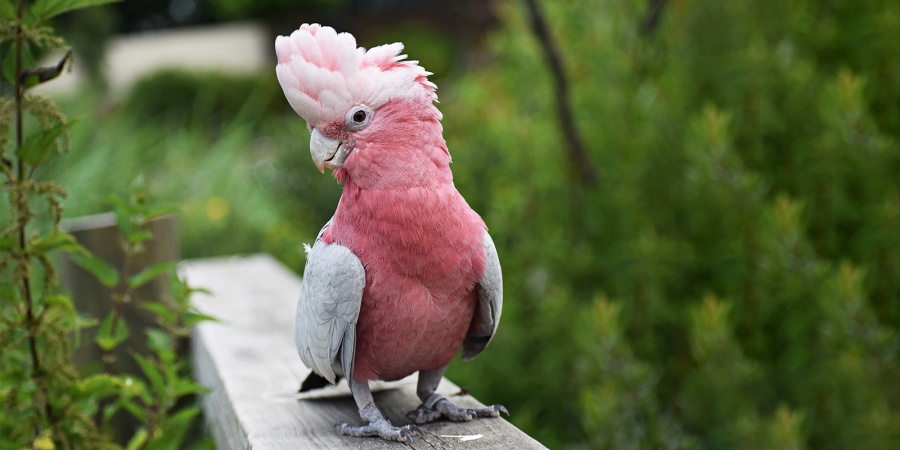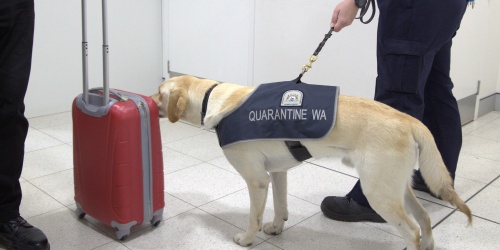
Pink and grey galah
Following the commencement of the BC Act and Regulations, a Wildlife Licensing and Compliance online system is being developed. Once an applicant has registered in the system, it will allow a person to manage licence requirements under the BC Act and Regulations including apply for available licences, enter and submit return information, and renew licences. The system is passwordless, and to login an email will be sent to a nominated email address with a link to access the system.
Online Wildlife Licensing System
As licence types are added to this system, the list below will be updated accordingly. The following licence applications are available online
Visit the Wildlife Licensing System
- Fauna possessing (pet keeper's) licence - Possess fauna as a pet *Standard or advanced category dependent on species held.
- Fauna importing licence - Import live fauna or fauna products
- Fauna exporting licence - Export live fauna or fauna products
- Fauna taking (dangerous fauna) licence - Take dangerous fauna threatening public health or safety, stock or domesticated animals
- Fauna causing damage licence - Take or disturb fauna causing an impact on public safety or biosecurity, or economic or biodiversity damage
Application forms (downloadable forms)
Application forms are available in the downloads section below. For licence types with no attachment, please contact Wildlife Licensing Section on wildlifelicensing@dbca.wa.gov.au or (08) 9219 9000 (and select the Wildlife Licensing option).
| Licence | Description | ||
|---|---|---|---|
| Fauna taking (commercial products) licence* | Take and supply fauna (as fauna product) for commercial purposes | ||
| Fauna taking (commercial purposes) licence* | Take (as live fauna) and supply fauna for commercial purposes | ||
| Fauna taking (scientific or other purposes) licence* | Take fauna for non-commercial purposes including education, research, study and conservation | ||
| Fauna taking (biological assessment) licence* | Take or disturb fauna for inventory work (and obtain specimens for identification purposes) in the provision of environmental consulting services | ||
| Fauna taking (relocation) licence* | Take or disturb fauna for the purpose of relocating | ||
| Fauna disturbing (commercial interaction) licence* | Disturb fauna for commercial interaction purposes | ||
| Fauna disturbing (other purposes) licence* | Disturb fauna for non-commercial purposes including education, research study or conservation, or non-commercial tours | ||
| Fauna disturbing (feeding) licence* | Disturb fauna by feeding or luring fauna | ||
| Fauna possessing (display) licence* | Possess fauna to display for conservation or education purposes *Standard or advanced category dependent on species held. | ||
| Fauna possessing (breeding) licence* | Possess fauna for the purpose of breeding and supply | ||
Fauna possessing (other purposes) licence
| Possess fauna for education, conservation study, conservation or rehabilitation purposes | ||
Fauna possessing (pet keeper's) licence
| |||
| Fauna processing licence* | Process fauna and/or operate a processing establishment | ||
| Fauna dealing (general dealer’s) licence* | Deal in fauna (dead or alive) | ||
| Fauna dealing (pet dealer’s) licence* | Deal in fauna to be kept as pets *Standard or advanced category dependent on species held. | ||
| * Please contact Wildlife Licensing Section to obtain copies of the application forms or for any other information. | |||
Fact sheets & guidelines
Licences to keep reptiles, amphibians and birds as pets
In Western Australia, a licence is required to keep reptiles, amphibians and some species of birds as pets. For more information on the licence requirements, see the Aviculture and Herpetofauna Fact sheet.
Species of fauna that can be kept and under what category licence (Standard or Advanced) are listed in the Pet keeping and dealing list.
Licences are required to deal in reptiles, amphibians and birds for the pet industry. DBCA is not currently accepting applications for new herpetofauna taking licences (Fauna taking (commercial purposes) licence), however existing licensees can renew their licence under the new regime. DBCA is currently establishing a consultative committee to assist the department in the development of relevant policy and practice.
Refer to CEO licensing guideline – Fauna possessing (pet keeper’s) and CEO licensing guideline – Fauna dealing (pet dealer’s) below.
Licences for fauna rehabilitation
A sick, injured or abandoned native animal must be returned to the wild at the place where it was originally taken if it is capable of fending for itself; or given to a DBCA wildlife officer, a veterinary surgeon or a person who is authorised under a licence to rehabilitate fauna (i.e. the holder of a Fauna possessing (other purposes) licence). This must be done as soon as possible and within 72 hours of finding the sick, injured or abandoned animal.
If you find a sick, injured or abandoned animal and you require advice you should contact the Wildcare Helpline on 9474 9055.
For species listed as threatened or specially protected or penguins, notification must be given to DBCA within 24 hours of taking possession of the animal. This can be done by completing the Injured or Abandoned Fauna Notification Form and emailing it to wildlife.protection@dbca.wa.gov.au.
More information on how to apply for a licence can be found in the Wildlife Rehabilitation Fact Sheet below.
Licences to display fauna
New arrangements under the regulations ensure that native animals on display are contributing to conservation while ensuring their welfare needs are being met. More information on the licences required is in the Fauna Display Fact Sheet below.
Refer to CEO licensing guideline – Fauna possessing (display) below.
Biological fauna surveys
A person who takes fauna for inventory work conducted in the provision of environmental consulting services and obtains specimens for identification purposes associated with this work can do so under a Fauna taking (biological assessment) licence.
More information on licence requirements can be found in the Environment Consultants Fact Sheet below.
Commercial kangaroo harvest
More information on licence requirements can be found in the Kangaroos harvest Fact Sheet.
Managed fauna - No licence required
There are some species of fauna that can be taken without a licence. More information on these species, including maps of the areas in which managed fauna can be taken are available below.
Restricted bird keeping and importing
DBCA issues restricted bird keeping permits on behalf of the Department of Primary Industries and Regional Development (DPIRD). The application form and other information is available for download below.
For information on the import of restricted birds into WA, please contact DPIRD by phone on 08 9363 4061 or 1800 084 881, or by email at enquiries@dpird.wa.gov.au or padis@dpird.wa.gov.au.
Contact details
Contact us for further information on wildlife licensing.
Physical address:
17 Dick Perry Avenue
Technology Park, Western Precinct
KENSINGTON WA 6151
Postal address:
Wildlife Licensing Section
Locked Bag 30
Bentley Delivery Centre WA 6983
Australia
Telephone: +61 8 9219 9831
email: wildlifelicensing@dbca.wa.gov.au
